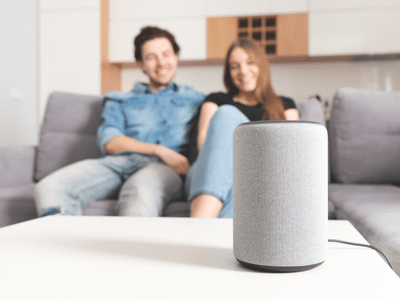
In this article, we will outline some of the key considerations when using smart technology, and just how much time and money these smart devices save us.
A massive 57% (and counting) of homes in Britain now contain a smart device, according to a survey conducted by Smart Home Week, with these individuals tending to be of the lower age brackets. A smart device is an electronic device, generally connected to other devices or networks via different wireless protocols such as Bluetooth – but do smart devices actually save us money?
Do smart devices save us money?
An article written by Buy Association states that landlords may want to look towards investing in smart technology in their rental properties to attract more appeal from the rental market and stand out, so to speak.
With the current energy crisis, smart devices can help keep bills low, for both landlords and tenants. Hive and Google Nest are incredibly popular with landlords and can be conveniently turned down through an app if nobody is home. Smart thermostats that control your hot water and radiators make the biggest impact on energy bills. They can even keep an eye on the weather forecast to control the heating on warm days or keep your home comfortable on cold mornings and even help avoid heating an empty house. The Independent has reported that the regulator Ofgem has announced that household energy bills will hit a staggering £3,549 by October, so with these increases in mind, it is worth keeping an eye on our own consumption and not just being reliant on smart devices.
In addition, smart cameras can also be installed to give landlords and tenants some peace of mind – and they are not just a safety precaution. This is Money states that insurance providers are becoming wise to the new smart tech, and having cameras installed may bring down insurance premiums. Insurance providers are slightly behind the times and may need years of figures to process before implementing an exact monetary figure for exactly how much smart tech can save us on insurance, but at least it’s being recognised!
How much can we save?
Recent research conducted by The Energy Saving Trust found that having smart heating controls at home could save you around £60 and 310kg of carbon dioxide a year. In a typical UK household, more than 50% of the money spent on energy bills goes towards providing heating and hot water and you can read more information here on how best to use these systems to get the most out of your heating devices.
According to Shell, 15% of a typical household’s electricity bill consists of lighting costs. It may be beneficial to use LED bulbs, as they could save you up to £180 over the lifetime of just one bulb!
Gone are the days when you must swiftly return home after setting off to work and having realised that you’ve left an appliance switched on! Using a smart plug for these devices will ensure that it doesn’t need to be left on all day, wasting energy. Instead, you’ll be able to use your smartphone to turn the appliance off, even if you’re not at home. It’s safer too. Smart plugs are notorious for reducing wasted energy, with lights connected to a smart plug, you can have peace of mind by checking and turning off the lights that may have been left on and were drawing power when you’re not home. Users can also automatically turn off lights during specific times when homes are always empty. In addition, they can save up to 8.76kWh of electricity over a year.
The Eco Experts claim that setting up a smart home could save you £450 per year, yet another argument supporting that smart devices save us money.
Can smart devices also cost us?
Saving energy at home is important for several reasons – it’s good for our outgoings and helps us contribute to saving the planet. It is also important to select the correct devices to use at home and ensure they are used correctly. Whilst carrying out research for this article, there was not much information available on smart devices costing us money – other than the high initial purchase fee. It is also important to note that it can occasionally be a costly experience if something breaks and needs to be repaired, which would usually be at the landlord’s expense.
There are other points that may be of concern further down the line as products progress with intelligence. A study carried out by YouGov claims that security fears are one barrier to industry growth. Of the concerns people have about smart appliances, hacking/cyber-attacks come out on top, with 39% of non-owners saying this. Over a third (36%) of this same group believe the appliances are too expensive.
Overall, the studies and data compiled seem to suggest that despite the initial outlay of a smart device, they can save us money in the long term.
To read about more helpful ways to ensure you keep warm this winter, visit last week’s article here.




